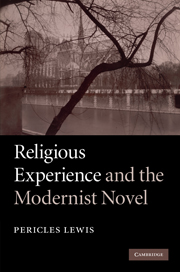Book contents
- Frontmatter
- Contents
- Acknowledgments
- 1 Churchgoing
- 2 God's afterlife
- 3 Henry James and the varieties of religious experience
- 4 Marcel Proust and the elementary forms of religious life
- 5 Franz Kafka and the hermeneutics of suspicion
- 6 Virginia Woolf and the disenchantment of the world
- 7 The burial of the dead
- Notes
- Select bibliography
- Index
3 - Henry James and the varieties of religious experience
Published online by Cambridge University Press: 26 February 2010
- Frontmatter
- Contents
- Acknowledgments
- 1 Churchgoing
- 2 God's afterlife
- 3 Henry James and the varieties of religious experience
- 4 Marcel Proust and the elementary forms of religious life
- 5 Franz Kafka and the hermeneutics of suspicion
- 6 Virginia Woolf and the disenchantment of the world
- 7 The burial of the dead
- Notes
- Select bibliography
- Index
Summary
When, in The Ambassadors, Lambert Strether introduces Waymarsh to his new acquaintance Maria Gostrey, he fears that his friend will see her as “a jesuit in petticoats, a representative of the recruiting interests of the Catholic Church”:
The Catholic Church, for Waymarsh – that was to say the enemy, the monster of bulging eyes and far-reaching, quivering groping tentacles – was exactly society, exactly the multiplication of shibboleths, exactly the discrimination of types and tones, exactly the wicked old Rows of Chester, rank with feudalism; exactly in short Europe.
Just enough over the top to signal itself as parody, this description of the Catholic Church as an octopus ironizes Protestant stereotypes about Catholicism on which James had drawn less self-consciously in some of his earlier novels. Yet if he shifts the tone of its expression, the equation of all the evils (and all the attractions) of Europe with the Catholic Church is a motif that appealed to James's imagination throughout his career. His writing draws continually on traditional Protestant conceptions of Catholicism, some positive but few without a suspicious underside: historical consciousness and dusty rituals, aristocratic grandeur and hyperconsciousness of rank, intellectual complexity and Jesuitical dissembling, spiritual suppleness and devious conduct, chivalry and mistreatment of women, aesthetic richness and sensual pleasure but also hypocritical asceticism.
Despite his lack of interest in formal theology, Henry James's imagination seems profoundly shaped by the Protestant religious tradition.
- Type
- Chapter
- Information
- Religious Experience and the Modernist Novel , pp. 52 - 80Publisher: Cambridge University PressPrint publication year: 2010

